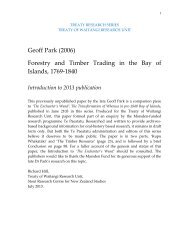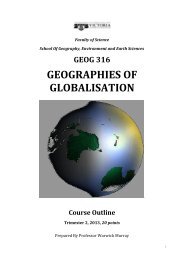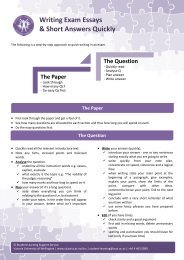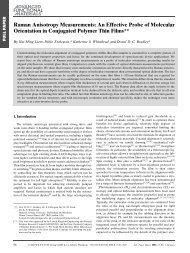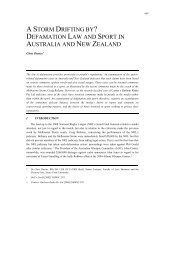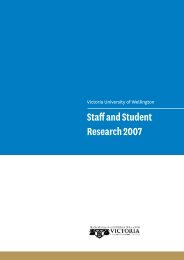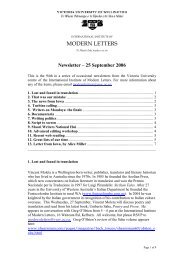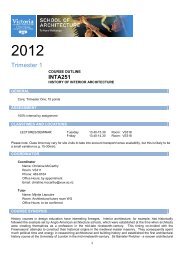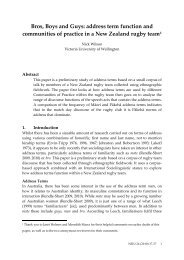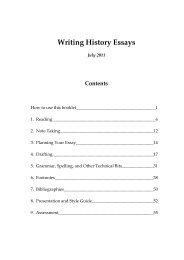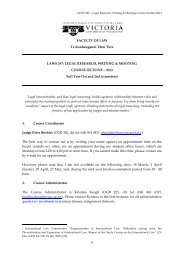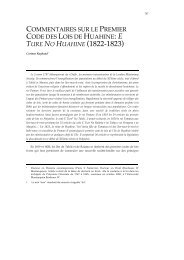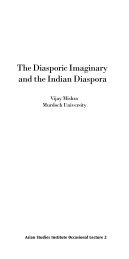Course outline for ACCY309 Trimester 2 2013 - Victoria University of ...
Course outline for ACCY309 Trimester 2 2013 - Victoria University of ...
Course outline for ACCY309 Trimester 2 2013 - Victoria University of ...
Create successful ePaper yourself
Turn your PDF publications into a flip-book with our unique Google optimized e-Paper software.
School <strong>of</strong> Accounting and Commercial Law<br />
ACCY 309<br />
INTERNATIONAL ACCOUNTING TOPICS<br />
<strong>Trimester</strong> 2, <strong>2013</strong><br />
COURSE OUTLINE<br />
Names and Contact Details Office Telephone<br />
<strong>Course</strong> Coordinator Dr Noor Houqe RH 712 463 6591<br />
Noor.Houqe@vuw.ac.nz<br />
Office Hours : Tuesday and Thursday 12 - 2.00pm<br />
Lecturer Dr Bhagwan Khanna TBA TBA<br />
Bhagwan.Kanna@vuw.ac.nz<br />
Office Hours: TBA<br />
<strong>Course</strong> Administrator Ms Lee Vassiliadis RH 708 463 5383<br />
lee.vassiliadis@vuw.ac.nz<br />
Office hours: Monday-Friday, 8.30am-5pm<br />
(Note: Office closed 10.30am-10.45am and 3.30pm-3.45pm)<br />
<strong>Trimester</strong> Dates<br />
Teaching Period: Monday 15 July – Friday 18 October<br />
Study Period: Monday 21 October – Thursday 24 October<br />
Examination Period: Friday 25 October – Saturday 16 November (inclusive)<br />
Withdrawal from <strong>Course</strong><br />
1. Your fees will be refunded if you withdraw from this course on or be<strong>for</strong>e Friday 26 July<br />
<strong>2013</strong>.<br />
2. The standard last date <strong>for</strong> withdrawal from this course is Friday 27 September <strong>2013</strong>. After<br />
this date, students <strong>for</strong>ced to withdraw by circumstances beyond their control must apply <strong>for</strong><br />
permission on an ‘Application <strong>for</strong> Associate Dean’s Permission to Withdraw Late’ including<br />
supporting documentation. The application <strong>for</strong>m is available from either <strong>of</strong> the Faculty’s<br />
Student Customer Service Desks.<br />
Class Times and Room Numbers<br />
Lectures will be held on:<br />
Tuesday 3.40pm – 5.30pm in GBLT4<br />
Friday 3.40pm – 4.30 in GBLT4<br />
1
<strong>Course</strong> Delivery<br />
There are no tutorials. Some hand-outs will be given out during class times while other materials<br />
could be posted on Blackboard at the lecturer’s discretion.<br />
Tentative Lecture Schedule (Teaching Topics):<br />
Dr Bhagwan Khanna will lecture during the first half <strong>of</strong> the course. Dr Noor Houqe will lecture<br />
during the second half <strong>of</strong> the course.<br />
Date & Topic<br />
Week 1 – week beginning 16 th <strong>of</strong> July<br />
2012<br />
Prescribed readings<br />
Chapters 1 and 2, Nobes and Parker<br />
Introduction to international accounting<br />
Causes and examples <strong>of</strong> international<br />
differences<br />
Week 2 – week beginning 23 rd <strong>of</strong> July<br />
2012<br />
Chapter 3, Nobes and Parker<br />
International classification <strong>of</strong> financial<br />
reporting<br />
Week 3 – week beginning 30 th <strong>of</strong> July<br />
2012<br />
International harmonization ef<strong>for</strong>ts<br />
The context <strong>of</strong> financial reporting by<br />
listed groups<br />
Week 4 – week beginning 6 th <strong>of</strong><br />
August 2012<br />
The requirements <strong>of</strong> International<br />
Financial Reporting Standards (IFRS)<br />
Week 5 – week beginning 13 th <strong>of</strong><br />
August 2012<br />
Different versions <strong>of</strong> IFRS in practice<br />
<br />
<br />
<br />
<br />
<br />
Chapters 4 and 5, Nobes and Parker<br />
Ball, R. (2006). International Financial Reporting<br />
Standards (IFRS): pros and cons <strong>for</strong> investors,<br />
Accounting and Business Research, International<br />
Accounting Policy Forum (Special Issue), pp. 5-27.<br />
Chapter 6, Nobes and Parker<br />
Penman, S. (2007). Financial Reporting Quality: Is<br />
Fair Value a Plus or a Minus? Accounting and<br />
Business Research, Special Issue, International<br />
Accounting Policy Forum, 33-44.<br />
Chapter 7, Nobes and Parker<br />
Week 6 – week beginning 20 th <strong>of</strong><br />
August 2012<br />
Financial reporting in the United States<br />
<br />
Chapter 8, Nobes and Parker<br />
Whittington, G. (2005). The Adoption <strong>of</strong> International<br />
Accounting Standards in the European Union,<br />
European Accounting Review, 14 (1):127-53.<br />
MID-TRIMESTER BREAK 26 th August – 8 th September <strong>2013</strong><br />
2
Date & Topic<br />
Week 7 – week beginning 9 th <strong>of</strong><br />
September <strong>2013</strong><br />
Financial reporting in China and<br />
Japan<br />
Week 8 – week beginning 16 th <strong>of</strong><br />
September <strong>2013</strong><br />
The context <strong>of</strong> financial reporting<br />
by individual companies<br />
Week 9 – week beginning 23 rd <strong>of</strong><br />
September <strong>2013</strong><br />
Foreign currency translation<br />
Week 10 – week beginning 30 th<br />
<strong>of</strong> September <strong>2013</strong><br />
International financial analysis<br />
<br />
<br />
<br />
<br />
Prescribed readings<br />
Chapter 11, Nobes and Parker<br />
Chapter 12, Nobes and Parker<br />
Chapter 17, Nobes and Parker<br />
Chapter 21, Nobes and Parker<br />
Week 11 – week beginning 7 th <strong>of</strong><br />
October <strong>2013</strong><br />
Discussion topics will be advised in week 7<br />
Social environmental and ethical<br />
issues<br />
Week 12 – week beginning 14 th<br />
<strong>of</strong> October <strong>2013</strong><br />
Discussion topics will be advised in week 7<br />
Pr<strong>of</strong>essionalism and the public<br />
interest<br />
Group Work<br />
No group assignment except non-assessed presentations in class, where everyone is required to<br />
participate in small groups. Further details on discussion topics will be provided. These will be part<br />
<strong>of</strong> the examinable material.<br />
Expected Workload<br />
Students are expected to devote at least 4 hours <strong>of</strong> preparation time per lecture. Students are also<br />
expected to have read the assigned readings and to have done the assigned homework be<strong>for</strong>e each<br />
class. The minimum total hours that students are expected to reasonably devote to the course are on<br />
an average 12 hours per week.<br />
Prescription<br />
Accounting standards setting and corporate financial reporting practices in selected countries.<br />
Accounting issues affecting multinational enterprises such as <strong>for</strong>eign exchange translations, transfer<br />
pricing, segment reporting, financial statement analysis and harmonisation <strong>of</strong> accounting standards.<br />
3
<strong>Course</strong> Learning Objectives<br />
By the end <strong>of</strong> this course, students should be able to:<br />
1. state national accounting concepts and procedures;<br />
2. present and analyse financial statements as per nations’ contextual variables;<br />
3. explain major differences between countries in their approaches to financial reporting;<br />
4. understand harmonisation and standardisation;<br />
5. understand functional currencies;<br />
6. explain the development <strong>of</strong> international financial accounting standards and the role <strong>of</strong> the<br />
International Accounting Standards Board;<br />
7. analyse the social, environmental and ethical issues that are involved in the internationalisation<br />
<strong>of</strong> business and the role <strong>of</strong> accounting within that; and<br />
8. analyse the implications <strong>of</strong> pr<strong>of</strong>essionalism and the “public interest” in the international<br />
business environment.<br />
<strong>Course</strong> Content<br />
This course builds on knowledge acquired in other accounting courses and will cover topics such as<br />
the need <strong>for</strong> and importance <strong>of</strong> studying international accounting; the role <strong>of</strong> cultural and societal<br />
values in understanding differences in accounting and reporting practices in the USA, the UK,<br />
Australia, France, China, India and Japan; international harmonisation process and the role <strong>of</strong> the<br />
International Accounting Standards Board (IASB).<br />
The course will also examine the nature and growth <strong>of</strong> multinational corporations and financial<br />
reporting issues such as segment reporting, consolidation and financial statement analysis, <strong>for</strong>eign<br />
exchange and accounting <strong>for</strong> <strong>for</strong>eign currency transactions. In addition, international transfer<br />
pricing and taxation issues will be discussed. This course <strong>of</strong> International Accounting is geared to<br />
examine the international dimensions <strong>of</strong> accounting, accounting history, financial reporting and<br />
analysis. It aims to provide students with an in-depth look at the multinational enterprise and the<br />
preparation and presentation <strong>of</strong> financial statements in different countries.<br />
We intend to cover the reasons <strong>for</strong> the study <strong>of</strong> international accounting, the concepts involved,<br />
influence <strong>of</strong> stages <strong>of</strong> economic growth on accounting development etc, financial disclosure,<br />
auditing, international corporate taxation, international accounting harmonization, a comparison <strong>of</strong><br />
global accounting methods and financial reporting, social and environmental issues, and ethics and<br />
the “public interest”. Some topics may be covered lightly, with a view to enabling students to<br />
undertake in-depth study <strong>for</strong> their assigned tasks.<br />
Readings<br />
The recommended text book is:<br />
Christopher Nobes and Robert Parker, Comparative International Accounting, (Pearson, 2012),<br />
12 th edition. ISBN 978-0-273-76379-6.<br />
In addition, you are strongly encouraged to refer to any book on International Accounting. A few<br />
are mentioned as follows:<br />
∙ Timothy Doupnik and Hector Perera, International Accounting, (McGraw-Hill Irwin, 2012), 3 rd<br />
edition. ISBN 978-0-07-811095-5.<br />
∙ Shahrokh M. Saudagaran, International Accounting: A User Perspective, 3 rd edition, 2009,<br />
CCH, ISBN 9780808020585.<br />
∙ Lee H. Radebaugh and Sidney J. Gray and Ervin L. Black, International Accounting and<br />
Multinational Enterprises, 6 th edition, 2006.<br />
4
Materials and Equipment<br />
Silent, non-programmable electronic calculators may be used in the end-trimester exam.<br />
Assessment<br />
Lectures will be the primary method <strong>of</strong> teaching and students are required to actively participate in<br />
the class discussions. Students will be required to complete a Research Essay as <strong>outline</strong>d below,<br />
(topic to be approved by at least one lecturer) dealing with current issue(s) <strong>of</strong> international<br />
accounting. The mid trimester test will be during the normal lecture hours. Other details about<br />
assessments are due as follows:<br />
Mid <strong>Trimester</strong> Test (Thursday 22 August, <strong>2013</strong>) 25%<br />
Research Essay (Friday 20 September, <strong>2013</strong> at 2pm) 25%<br />
Final Examination (2 hours) 50%<br />
Every piece <strong>of</strong> work submitted <strong>for</strong> assessment is to be substantially your own, although you are<br />
encouraged to discuss your ideas and approaches as they develop with other students. Submitting<br />
another’s work as your own would be unethical, whether you are detected or not, and is not<br />
consistent with the behaviour expected <strong>of</strong> students. There are substantial penalties (detailed in the<br />
<strong>University</strong> Calendar) <strong>for</strong> academic misconduct.<br />
Students must complete the research essay to a satisfactory standard. Maximum length: 2000 words<br />
excluding reference list and footnotes. Students must submit the research essay topic as approved<br />
by Dr Noor Houqe or the other lecturer in the course.<br />
The due date <strong>for</strong> the research essay is: Friday 20 September, <strong>2013</strong> at 2pm<br />
The research essay is designed to give scope to the students to explore systematically and in more<br />
depth areas <strong>of</strong> international accounting practice and their role in globalization processes. Issues that<br />
students would be able to interrogate include, but are not limited to, the state national accounting<br />
concepts and procedures; the cause <strong>of</strong> differences between countries in their approaches to financial<br />
reporting; the politics and social effects <strong>of</strong> harmonization; the history and evolution <strong>of</strong> international<br />
accounting institutions such as the IASB; emission trading schemes, carbon accounting and climate<br />
change mitigation; and the social and ethical issues raised by accounting’s implication in global<br />
economic and financial flows.<br />
Penalties<br />
Late submission will incur a penalty <strong>of</strong> 10% per day <strong>of</strong> the allocated marks <strong>for</strong> the research essay.<br />
Use <strong>of</strong> Turnitin<br />
Student work provided <strong>for</strong> assessment in this course may be checked <strong>for</strong> academic integrity by the<br />
electronic search engine http://www.turnitin.com. Turnitin is an on-line plagiarism prevention tool<br />
which compares submitted work with a very large database <strong>of</strong> existing material. At the discretion <strong>of</strong><br />
the Head <strong>of</strong> School, handwritten work may be copy-typed by the School and submitted to Turnitin.<br />
A copy <strong>of</strong> submitted materials will be retained on behalf <strong>of</strong> the <strong>University</strong> <strong>for</strong> detection <strong>of</strong> future<br />
plagiarism, but access to the full text <strong>of</strong> submissions will not be made available to any other party.<br />
Examinations<br />
Students who enrol in courses with examinations are obliged to attend an examination at the<br />
<strong>University</strong> at any time during the <strong>for</strong>mal examination period. The final examination <strong>for</strong> this course<br />
will be scheduled at some time during the following period:<br />
Friday 25 October – Saturday 16 November (inclusive)<br />
5
Mandatory <strong>Course</strong> Requirements<br />
There are no mandatory course requirements.<br />
If you cannot complete an assignment or sit a test or examination, refer to:<br />
www.victoria.ac.nz/home/study/exams-and-assessments/aegrotat<br />
Class Representative<br />
A class representative will be elected in the first class, and that person’s name and contact details<br />
made available to VUWSA, the course coordinator and the class. The class representative provides<br />
a communication channel to liaise with the course coordinator on behalf <strong>of</strong> students.<br />
Communication <strong>of</strong> Additional In<strong>for</strong>mation<br />
In<strong>for</strong>mation such as course notices will be posted on Blackboard.<br />
Student feedback<br />
Student feedback on <strong>University</strong> courses may be found at:<br />
www.cad.vuw.ac.nz/feedback/feedback_display.php<br />
Link to general in<strong>for</strong>mation<br />
For general in<strong>for</strong>mation about course-related matters, go to:<br />
http://www.victoria.ac.nz/vbs/studenthelp/general-course-in<strong>for</strong>mation<br />
Note to Students<br />
Your assessed work may also be used <strong>for</strong> quality assurance purposes, such as to assess the level <strong>of</strong><br />
achievement <strong>of</strong> learning objectives as required <strong>for</strong> accreditation and academic audit. The findings<br />
may be used to in<strong>for</strong>m changes aimed at improving the quality <strong>of</strong> VBS programmes. All material<br />
used <strong>for</strong> such processes will be treated as confidential, and the outcome will not affect your grade<br />
<strong>for</strong> the course.<br />
************************<br />
6



